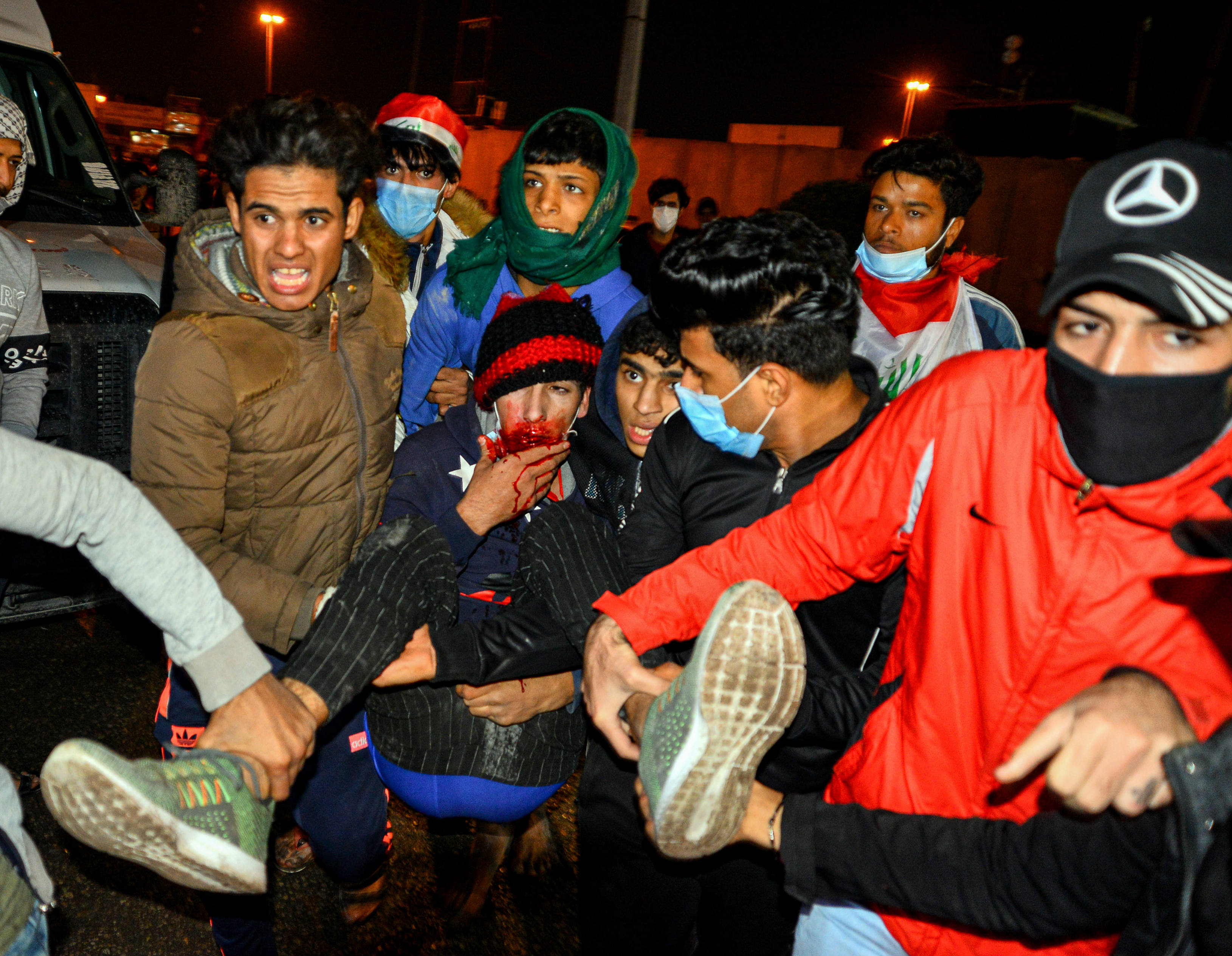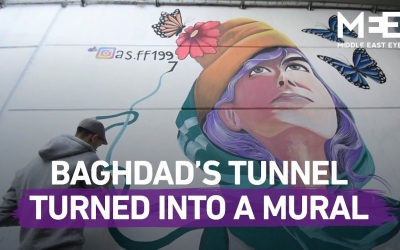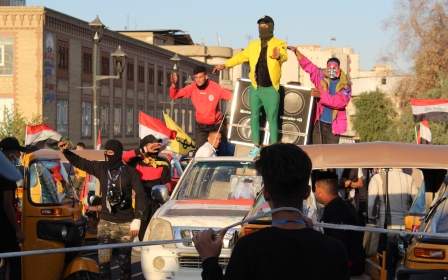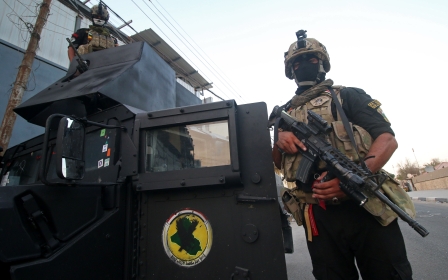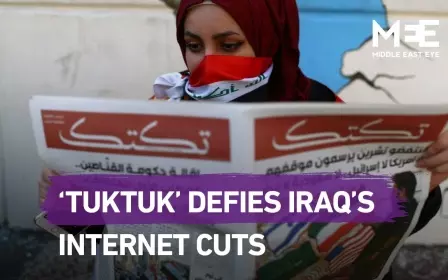Dozens killed across Iraq after torching of Iranian consulate in Najaf
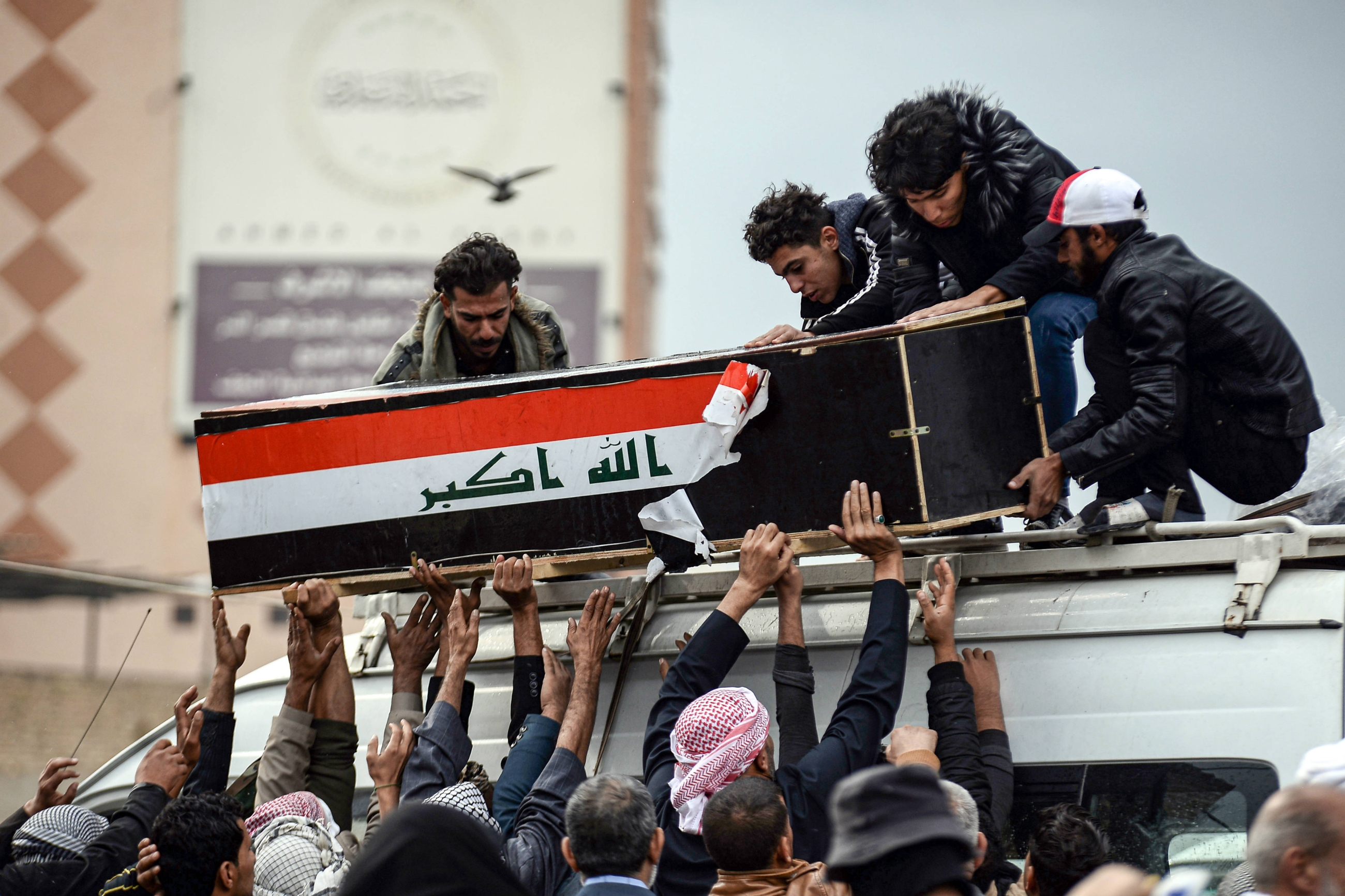
At least 45 people have been shot dead by security forces across Iraq over the past 24 hours, after protesters torched the Iranian consulate in the southern city of Najaf.
At least 29 people died in the southern city of Nasiriyah when troops opened fire on demonstrators who blocked a bridge before dawn on Thursday and later gathered outside a police station.
Police and medical sources said dozens of others were wounded.
Four people were killed in Baghdad, where security forces opened fire with live ammunition and rubber bullets against protesters near a bridge over the Tigris river, the sources said, and twelve died in clashes in Najaf.
'Iran has to realise Iraqis from south to north are against any Iranian presence'
- Karar al-Assaf, witness
A curfew was imposed in Najaf following the attack on the consulate, which led the Iranian government to demand a "firm response" from its Iraqi counterpart. Businesses and government offices were closed, state media reported.
New MEE newsletter: Jerusalem Dispatch
Sign up to get the latest insights and analysis on Israel-Palestine, alongside Turkey Unpacked and other MEE newsletters
In a statement on Thursday evening, the influential Shia cleric Muqtada al-Sadr called on the government to resign immediately or it would mean "the beginning of the end of Iraq," warning that the country could turn into Syria if the problems were not addressed.
One eyewitness in Najaf told Middle East Eye that security forces fired tear gas at the protesters following the attack on the consulate.
He said tuk-tuk drivers had driven the wounded to the city's main square, where medical volunteers were helping to aid them.
“[There are] more than 70 volunteers from different medical professions, and they can provide enough care to that large a number of the protesters, as the government could not do so,” said Karar al-Assaf.
He said the burning of the consulate was a "message sent by the people to the government that they refuse the Iranian presence in all Iraq, including the Shia-majority regions".
“From time to time, Iraqis renew their anger against the Iranian role in Iraq... Iran has to realise Iraqis from south to north are against any Iranian presence,” he added.
Anti-Iranian sentiment
The torching of the consulate escalated violence in Iraq after weeks of mass demonstrations that aim to bring down a government seen as endemically corrupt and backed by Tehran.
It was the strongest expression yet of the anti-Iranian sentiment of demonstrators, who have taken to the streets since 1 October in Baghdad and the Shia-majority south.
Iranian foreign ministry spokesman Abbas Mousavi criticised the Iraqi government's failure to prevent the incident.
"The Iraqi government is responsible to secure safety of diplomatic missions and diplomats in Iraq... Tehran strongly condemns the attack and demands the Iraqi government's firm response to the aggressors," state TV quoted him as saying on Thursday.
Iran's state news agency IRNA said staff at the consulate, who had evacuated shortly before demonstrators broke in, were "safe and unharmed".
The Iraqi government has condemned the attack.
Officials in Iraq's southern Nasiriyah province also announced they were imposing a city-wide curfew on Thursday.
The monitoring group Netblocks said internet access had been restricted in Nasiriyah:
Security forces were deployed around the edges of the city, searching all cars and people trying to enter, a correspondent for AFP said.
Local media reported that tribal groups in Nasiriyah were warning they would take up arms to protect protesters.
Armed members of the al-Badur and al-Ghazi tribes reportedly deployed around crucial entrances to the city, to prevent security forces sending further reinforcements.
Military commanders dispatched
Prime Minister Adel Abdul Mahdi has dispatched military commanders to several provinces swept up by the protests in a bid to "restore order".
Authorities said "crisis cells" in the provinces would be led by provincial governors but would include military leaders who would take charge of local security and military forces.
However, Lieutenant General Jamil al-Shammari, head of one of the crisis cells in Nasiriyah was reportedly removed from his role only hours after being appointed, following a request from the governor of Dhi Qar province.
According to Alsumaria TV, Adel al-Dakhili blamed Shammari for causing the deaths of protesters.
"We call on the commander-in-chief of the armed forces to remove Lieutenant General Jamil al-Shammari from the province for disturbing public security and causing dozens of deaths and injuries," he said.
Shammari was previously sacked from his role as Basra Operation Commander in September 2018 after the deaths of protesters in the southern province at the hands of security forces earlier that month.
Protesters in Basra burnt down the Iranian consulate in that city in July 2018. However, this was blamed by some on "infiltrators" attempting to provoke the security forces.
Abu Mahdi al-Muhandis, deputy leader of the paramilitary Hashd al-Shaabi forces, warned that they would "cut the hand of anyone" who attempted to come near influential Shia cleric Ali Sistani in Najaf.
The protests, which began in Baghdad on 1 October and have spread throughout southern cities, are the most complex challenge facing the Shia-dominated ruling class that has controlled state institutions and patronage networks since the 2003 US-led invasion that toppled longtime Sunni ruler Saddam Hussein.
Protesters are mostly unemployed youths who are demanding the departure of Iraq's entire political elite.
Security forces have used live ammunition, tear gas and stun grenades against mostly unarmed protesters, killing more than 390, AFP said. Some demonstrators have lobbed petrol bombs, bricks and fired slingshots at police.
Video footage released on social media appeared to show security forces opening fire on demonstrators in Nasiriyah on Wednesday night:
The footage could not be independently verified by MEE.
Anger against Iran has been a repeated feature of the protests, with protesters blaming Iran and Iran-backed politicians of looting and controlling the country.
One protester told MEE last week that the outbreak of protests in Iran - which have also seen dozens killed by security forces - were "God's punishment" on the government in Iran for their actions.
"The Iraqi people are angry and now God is punishing them [the Iranian government] with this public revolt against them," said Awathal, a protester.
"We have no problem with the Iranian people. We have a problem with the authorities. We have a problem with [Islamic Revolutionary Guard Corps commander] Qassem Soleimani. We have a problem with [Iran Supreme Leader] Ali Khamenei."
AFP and Reuters contributed to this report.
Middle East Eye delivers independent and unrivalled coverage and analysis of the Middle East, North Africa and beyond. To learn more about republishing this content and the associated fees, please fill out this form. More about MEE can be found here.


